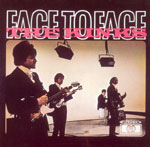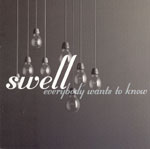I Don't Want to be Happy
| |

| In my local Co-op, waiting to use the photocopier, and a pop revelation hits me. Travis blare through the sound system. Christ, reality opens up and you can see clearly through the wind and rain outside. Through the crack in the firmament. Sing, sing, they moan. Yes, Sing Sing. This song should have been written in the prison of the same name. Those snivelling teen pin-ups sent down for crimes against guitar pop. Twenty Thousand Years in Sing Sing. Pelecanos should write a sequel to the old Warner Bros gangster flick, exposing the armies of invisible blandness corroding the world. Where are the new fantasistas, turning a two-minute burst of insight into new words, sounds or images that MATTER. Face to face with your soul, on a beat-up photocopier, trundling along at five copies per minute. Face to Face with the Kinks. Sharp guitars cocked at impossible angles. Black and white faces etched in emphatic relief. Ray Davies had many stories to tell when he came to write this album. The theme stares out at you on the first bonus track, tellingly left off the original album. Aching, withdrawn, a stick dipped in a cauldron of tar: 'I'm Not Like Everybody Else'. The Wolfhounds took this song and scuffed up its already ragged features, with a lyric that could have strayed off the runway of 'Me'. Like Le Carre's spy from the cold, the lines are etched on the faces, and the secrets are stubborn, entangled and wired up to suck you into their net of intrigue. Castle did us all a favour by resurrecting the mono version of this lp for the recent reissue series. It sounds so much scratchier, a product of the streets (Dead End Street?), smoke rising from the coal-fired chimneys and slate roof tiles. Prole art threat. If that conjures up images of 60's soap and kitchen sinks, then this is Coronation Street for a late night audience, produced by Tony Wilson with bigger-than-life roles for a different bunch of party people. The characters that populate this vintage of Kinks material are a sadder and wiser brood than the teenage-kicks seeking joy riders of old. It's the difference between the monochrome images Terence Donovan was shooting for Vogue magazine around that time and his later, more thoughtful work. Caught behind tree branches, his models are at home in sharp suits and tranquil narcissism, a machine gun in hand and barely a crease in the smile. Pent-up energy caught in the folds of those neatly tailored garments, primed to explode. Then the later series of railway adverts featuring Tony Hancock in a variety of nerve-jangling situations, cooped in a railway carriage, all irascible despair, or surrounded by litter and the late night fodder of fast food and last trains to Doomsville. Hancock's famous appearance on the 60's Face to Face series, John Freeman peddling cod psychology, neat parcels of charm-school interrogation fired at Hancock. Flicks of the wrist dispel the troubling cigarette ash, but Anthony Aloysius can't shake off the terrier-like questioning, the nag-nag-nagging of the questions sent his way. The greater the gaps Freeman finds in the persona, the bigger the names Hancock defends himself with. Doubt, despair, the joker's crown? Read Kierkegaard and Camus. I find the same pattern in Davies' songwriting of this period- 'Dandy' is a portrait of a Beau Brummel on the run, living for the moment, but about to be sucked into the crowd all the same. The baroque harpsichord flourishes on the album's standout 'Too Much On My Mind' are pure inspiration, sticking with the POP recipe while all around were trading their mental kinks for acid and sitars. The song meanders its melancholy path, stately as a Bentley but with the rust showing through the bodywork. I love the way Wim Wenders used this song on American Friend, his greatest homage to classic film noir. With cameos from Nick Ray and Sam Fuller, and a coherent character role for Dennis Hopper for once, there's a truly human edge to the tale of fallen angel Bruno Ganz's nocturnal wanderings. He sweeps up the leaves in his workshop, singing the words to the song in a deadpan groan. Time stands still. A whirlpool vision of shame. Gravity and grace- resistance is low, if not futile. |

| Swell have been perfecting the low groan of dissatisfaction over the years. There's nothing bowed or stifled about their brand of agitation. From their early soundscapes, filling their songs with dark guitar wastelands of guttural disenchantment, there's been a bleak but controlled taste for old Western drama at the heart of their music. Those earlier albums had the resolute, imperturbable quality of handmade moonshine liquor. The sort that the granddad guzzles in small but corrosive quantities in Jim Dodge's duck fable Fup, a gnarled tribute to the crazy horse Indian who passed the mystery recipe down as his parting gesture. All Swell's best moments leave you giddy with intoxication- you can flap your wings, and their tightly-focussed propulsion sends you soaring, if you have the taste for heights. Everybody wants to know Swell. If you don't, you're not worth knowing. Their latest, which still sounds fresh, noble and surprising enough to count as a new release, continues the assault, but the brew is prepared this time at a slightly lower level of concentration. Nothing is missing in pungency or intensity of flavour, just a subtler shading of their wares, as if by slowing things down slightly you see more of the twisted landscape of debris and psychic excess strewn around. How did that ep put it, the one with the strange deserted house on the front cover and the spartan armchair on the inside? Room to Think. That's exactly what they achieve here. Spacious design, rugged upholstery, preparation for immersion in a riveting experience. The slightly more relaxed tempo is a trick of studio production of course. The light bulbs littered through the artwork should alert you to that. These bulbs shine brightly but crash to the ground, abruptly fizzle out into darkness. How much wattage can you tolerate?, they ask. 'Could have been a fine old more-or-less/ Still might shine before it's gone', from 'Someday Always Comes'. Similarly, 'Inside the Bomb' tells us all about their melodramatic impulses, a folded-up concertina sending their drifting serpent lines into the airways with a walk-on part for Danny. Like a comic book character Dan reappears from their debut lp. There he was 'Dan, a Son of God'- standing unshakeable on the sidewalk, an irresistible jumping Jack in a box. Unusually, there's room for an occasional instrumental here. For what occasion I don't know. A chance meeting with Stephin Merritt on the Trans-Europe Express perhaps. Closing what would be each side of the record, it reminds you of the tortured beauty pop is heir to. Turning up the luminosity levels several notches, 'I Don't Think So' is shimmering electronic capering dressed up with their slinking acoustic trademark. Swell, as their name reminds you, don't do lightweight throwaway electronica with a smile on their face. There's always a surge of discontent, a brief illumination, like Bogart in High Sierra, all rugged individualism and severe ACR haircut, just before he 'crashes out' in front of starry-eyed Ida Lupino. That throwaway recklessness emerges with a vengeance by the end of the record, with the references to burning out and crashing down. Behind the effortless surface assurance of this record, there's a tense flexing of musical instincts. Regrouping and concentrating, 'you're gonna need, to fight, to change'. There isn't an ounce of slack to wind through here, the only kinks are the ones you haven't found in your shirt sleeves. Open your mind, these ruffians remind us, insinuating, mutating, aggravating. David Freel still sings as if he's been taking vocal lessons from those masters of outlaw gruffness, the silver-tongued devil Kris Kristofferson and man in black Johnny Cash. Songs of disenchantment, conjuring up nothing so much as Johnny Guitar against a slashing Technicolor saloon background, the grim-faced determination of the finest country epics. Ageless and peerless, Swell borrow from the unlikeliest sources. A hint of Spanish guitar, the most sweeping Sergio Leone panoramas imaginable, and Swell might be desperados waiting for a train. They could just as easily be on the inside doing time, plotting their escape with the sparest of implements. A nail file, a plectrum, a spool of dental floss. 'Was it fate or too much drinking? / Johnny Cash and Martha Stewart,/ Prison songs on how to do it', as 'Try Me' puts it, unrepentantly. Wounded animals stamping their feet and baying at the wind. Sing, sing! Yeah, Sing Sing alright. © Marino Guida 2002 |